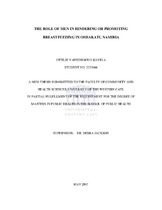| dc.contributor.advisor | Jackson, Debra | |
| dc.contributor.author | Kavela, Ottilie Vafeendjovo | |
| dc.contributor.other | School of Public Health | |
| dc.contributor.other | Faculty of Community and Health Sciences | |
| dc.date.accessioned | 2013-10-24T09:42:25Z | |
| dc.date.available | 2009/10/28 12:05 | |
| dc.date.available | 2009/10/28 | |
| dc.date.available | 2013-10-24T09:42:25Z | |
| dc.date.issued | 2007 | |
| dc.identifier.uri | http://hdl.handle.net/11394/2346 | |
| dc.description | Magister Public Health - MPH | en_US |
| dc.description.abstract | Breastfeeding id important for the health and well-being of infants. WHO recommends globally, exclusive breastfeeding for the first 6 months and thereafter, adequate and safe complementary foods to be introduced and baby to be breastfed for up to 2 years of age or beyond. Exclusive breastfeeding in Namibia is very low, at 26%. The study was designed to assess the group perception and view to appropriate breastfeeding patterns, explore the cultural beliefs of men on breastfeeding, attitudes of men towards breastfeeding and roles and actions of men that support or hnder breastfeeding. | en_US |
| dc.language.iso | en | en_US |
| dc.publisher | University of the Western Cape | en_US |
| dc.subject | Breastfeeding | en_US |
| dc.subject | Namibia | en_US |
| dc.subject | Breastfeeding | en_US |
| dc.subject | Cultural studies | en_US |
| dc.title | The role of men in hindering or promoting breastfeeding in Oshakati, Namibia | en_US |
| dc.type | Thesis | en_US |
| dc.rights.holder | University of the Western Cape | en_US |
| dc.description.country | South Africa | |

